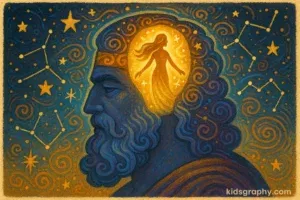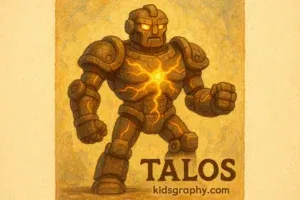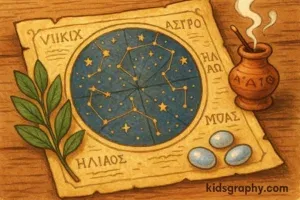In the vast world of Greek mythology, few stories are as heart-wrenching as that of Cassandra, the beautiful Trojan princess with a terrible gift. Her life was filled with truth, tragedy, and torment. While she could see the future, no one ever believed her. This cruel fate turned her life into one of pain and sorrow.
Let’s explore who Cassandra in Greek mythology truly was, the nature of her curse, and why her story still echoes in tales of warning and ignored wisdom.
Read More: Hephaestus: The Amazing Greek God of Fire and Forging!
Who Was Cassandra in Greek Mythology?
Cassandra was the daughter of King Priam and Queen Hecuba of Troy. She was known not only for her royal birth but also for her great beauty and intelligence.
But what made Cassandra stand out in Greek mythology was her special gift of prophecy—she could see the future with complete clarity. This power was given to her by the god Apollo, who was taken by her beauty and charm.
Read More: Athena in Greek Mythology: Goddess of Wisdom & War
The Curse of Cassandra
Though Apollo gave Cassandra the gift of foresight, things took a dark turn. When she refused his romantic advances, Apollo became angry and cursed her.
The curse? She would always tell the truth, but no one would ever believe her.
This made her gift a source of endless suffering. Imagine knowing the disasters to come—yet being laughed at, dismissed, or called mad every time you try to help.
Her visions became warnings no one trusted.
Read More: Pandora in Greek Mythology: The First Woman’s Curse
The Fall of Troy and Cassandra
Cassandra is best known for her role in the Trojan War.
- She warned the Trojans not to bring the wooden horse into the city.
- She cried out that the Greeks were hiding inside, waiting to attack.
- She begged and pleaded, but everyone ignored her.
The people of Troy thought she was out of control. As we know from the legend, the wooden horse was a trick. At night, Greek soldiers climbed out, opened the gates, and Troy was destroyed.
Cassandra had seen it all before it happened—but her truth was her curse.
Read More: Persephone in Greek Mythology: Queen of the Underworld
What Happened to Cassandra After Troy?
After the fall of the city, Cassandra’s tragedy didn’t end.
She was taken as a prize of war by Agamemnon, the Greek leader. He brought her back to Mycenae. But there, too, her visions spelled doom.
- She foresaw that she and Agamemnon would be murdered by his wife, Clytemnestra.
- Again, she warned everyone.
- Again, no one listened.
And as she predicted, they were both killed.
Her death marks one of the saddest moments in Greek mythology—a woman punished not for lies, but for telling the truth in a world that refused to hear it.
The Meaning and Legacy of Cassandra
Today, Cassandra’s name lives on. The phrase “a Cassandra warning” is used to describe someone who predicts trouble or disaster—but is ignored.
Her story teaches us:
- The pain of being unheard
- The danger of ignoring truth
- The burden of knowledge when others live in denial
Cassandra in Greek mythology remains a symbol of ignored wisdom and tragic foresight.
Read More: Hera in Greek Mythology: Queen of the Gods
Final Thoughts
Cassandra was more than just a myth—she was a voice of truth in a world of disbelief. Her life reminds us of the importance of listening, believing, and acting when someone warns of danger.
In a time full of heroes, gods, and warriors, Cassandra stood alone—not with a sword, but with the truth. And sometimes, that’s the hardest thing to carry.
Read More: Chaos in Greek Mythology: The First Being of Creation
Cassandra as a Symbol in Psychology and Literature
Cassandra’s story has become more than myth—it’s also a symbol in psychology and literature.
In Literature:
Writers throughout history have used Cassandra to symbolize the truth-teller who is ignored. From tragic plays to modern novels, her image appears when:
- A character speaks out but is dismissed
- A warning is unheeded until it’s too late
- A vision of disaster is met with denial
Aeschylus, one of Greece’s greatest playwrights, wrote about Cassandra in his famous tragedy Agamemnon, where she painfully predicts her own death, still unheard.
In Psychology:
There is a term called the “Cassandra Syndrome”, used to describe a person who has valid warnings or concerns but is constantly ignored or misunderstood. This can apply to:
- Whistleblowers
- Abuse survivors
- Activists or scientists warning about climate or health crises
In modern terms, Cassandra represents the emotional toll of being disbelieved, especially when someone is trying to protect others.
Read More: Prometheus in Greek Mythology: The Fire Bringer
Cassandra in Modern Media
Cassandra’s influence can even be seen in today’s books, movies, and TV shows:
- In some retellings, she is portrayed as a misunderstood heroine.
- In others, she becomes a tragic symbol of what happens when we fail to listen.
- Her story appears in feminist literature as a voice of powerful but silenced women.
She is featured or referenced in works by Christa Wolf, Madeline Miller, and even science fiction and fantasy authors, who see her gift as both powerful and painful.
Read More: Nyx in Greek Mythology: Goddess of the Night
Cassandra’s Strength Through Suffering
Despite the suffering she endured, Cassandra’s story is also about strength. She never stopped telling the truth—even when no one listened. She didn’t lie or change her visions to please others. That takes courage.
In many ways, she is a reminder that doing the right thing doesn’t always bring reward—but it still matters. Her pain was real, but so was her integrity. She teaches us that even if others ignore us, the truth is worth speaking.
More Stories: Cassandra in Greek Mythology
FAQ: Cassandra in Greek Mythology
Cassandra is a Trojan princess gifted with prophecy by Apollo, but cursed so no one would believe her visions.
Apollo cursed Cassandra so her true prophecies would never be believed, turning her gift into a lifelong torment.
She warned the Trojans not to bring the wooden horse inside the city, but her warnings were ignored—leading to Troy’s fall.
Yes, Cassandra was taken by Agamemnon and later killed by his wife, Clytemnestra, just as she had foreseen.
Cassandra symbolizes ignored truth and unheeded warnings, and her story is used in literature, psychology, and modern activism.
Read More: Calypso Greek Mythology: The Lonely Nymph











